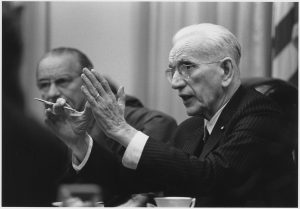by Robert Turner, Senior Fellow
 The monumental career and little-known personality of Speaker John W. McCormack were brought to life in the Ryan Lounge in November when Professor Garrison Nelson spoke of the history he knows so well.
The monumental career and little-known personality of Speaker John W. McCormack were brought to life in the Ryan Lounge in November when Professor Garrison Nelson spoke of the history he knows so well.
Nelson’s 910-page book, John William McCormack: A Political Biography, was published earlier this year to enthusiastic reviews and is headed for a third printing. Interim Chancellor Barry Mills welcomed Nelson to campus, and particularly to the McCormack School, saying that the current atmosphere in Washington makes it especially important for citizens to understand the workings of government.
In a wide-ranging discussion with McCormack Dean David W. Cash, Nelson described his subject as a man who avoided publicity, but who earned a reputation as a dominant debater on the floor of the House. Nelson related that McCormack once said he would have preferred to stay as majority leader – debating, assembling coalitions, and counting votes–rather than presiding as speaker. Still, his nine years as speaker (1962-1970), including most of John F. Kennedy’s presidency and the entirety of Lyndon Johnson’s, saw a wealth of accomplishment rivaling Franklin Roosevelt’s first term.
Asked by Dean Cash which part of his book he would recommend specifically to the current House speaker, Paul Ryan, Nelson unhesitatingly answered Chapters 2 and 3, containing the story of McCormack’s childhood and family history, marked by extreme poverty, anti-Irish prejudice, and a father who abandoned the family.
Indeed, when asked by chair of the Department of Public Policy and Public Affairs and Professor Christine Brenner about McCormack’s attitude toward women, Nelson described how much he revered his mother, who demonstrated almost unimaginable fortitude in holding the family together despite numerous hardships, including multiple losses to tuberculosis.
Nelson described McCormack as a man both passionate and pragmatic. One major example: the friction between him and the Kennedy family went deep, yet McCormack helped John F. Kennedy several times.
- In 1952, Congressman Kennedy’s candidacy for the Senate was in trouble with Jewish voters, but “Rabbi John” rescued him with an appropriation for Israel and a meeting with Jewish leaders in Boston. His motive in helping Kennedy, according to Nelson: “to get him out of the House.”
- In 1960, Kennedy appointed McCormack the floor manager at the Democratic Convention that nominated him for president. One key reason, according to Nelson, was the desire to get Lyndon Johnson to accept the nomination as vice president. Johnson might well have refused but for the endorsement by Speaker Sam Rayburn, and Rayburn might not have done Kennedy’s bidding without the intercession of his own protégé, McCormack.
- In 1964, the Civil Rights Bill that was seen as the signal legacy of the assassinated president was in danger of being bottled up, but McCormack joined an effort to discharge his own Rules Committee Chair from control of the bill, and it began to move within hours.
Nelson is one of the nation’s most respected and prolific experts on the government, especially the workings of Congress. He has also written about the presidency and the Supreme Court. He is retiring as the Elliott A. Brown Green and Gold Professor of Law, Politics, and Political Behavior at the University of Vermont.
Two of Speaker McCormack’s three grand-nephews–Edward J. (“Skip”) McCormack III and Sean McCormack–attended the talk, along with Skip’s wife, Linda. They exchanged anecdotes, including Skip’s recollections of numerous functions and Sunday-morning drives his great-uncle had invited him to when he was a student at Georgetown University. Skip and Sean McCormack are both grandsons of Edward J. McCormack–famous in Boston political lore as “Knocko” McCormack.
All in the family expressed a desire to strengthen the relationship between the speaker’s family and his namesake school.
